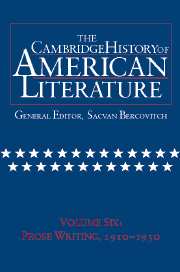Book contents
- Frontmatter
- Introduction
- A Cultural History of the Modern American Novel: Introduction
- 1 A Dream City, Lyric Years, and a Great War
- 1 The Novel as Ironic Reflection
- 2 Confidence and Uncertainty in The Portrait of A Lady
- 3 Lines of Expansion
- 4 Four Contemporaries and the Closing of the West
- 5 Chicago’s “Dream City”
- 6 Frederick Jackson Turner in The Dream City
- 7 Henry Adams’s Education and The Grammar of Progress
- 8 Jack London’s Career and Popular Discourse
- 9 Innocence and Revolt in the “Lyric Years”: 1900–1916
- 10 The Armory show of 1913 and the Decline of Innocence
- 11 The Play of Hope and Despair
- 12 The Great War and The Fate of Writing
- 2 Fiction in a Tme of Plenty
- 3 The Fate of Writing During the Great Depression
- Fictions of the Harlem Renaissance
- Ethnic Modernism
- Chronology
- Bibliography
- Index
2 - Confidence and Uncertainty in The Portrait of A Lady
from 1 - A Dream City, Lyric Years, and a Great War
Published online by Cambridge University Press: 28 March 2008
- Frontmatter
- Introduction
- A Cultural History of the Modern American Novel: Introduction
- 1 A Dream City, Lyric Years, and a Great War
- 1 The Novel as Ironic Reflection
- 2 Confidence and Uncertainty in The Portrait of A Lady
- 3 Lines of Expansion
- 4 Four Contemporaries and the Closing of the West
- 5 Chicago’s “Dream City”
- 6 Frederick Jackson Turner in The Dream City
- 7 Henry Adams’s Education and The Grammar of Progress
- 8 Jack London’s Career and Popular Discourse
- 9 Innocence and Revolt in the “Lyric Years”: 1900–1916
- 10 The Armory show of 1913 and the Decline of Innocence
- 11 The Play of Hope and Despair
- 12 The Great War and The Fate of Writing
- 2 Fiction in a Tme of Plenty
- 3 The Fate of Writing During the Great Depression
- Fictions of the Harlem Renaissance
- Ethnic Modernism
- Chronology
- Bibliography
- Index
Summary
The fiction of Henry James often features “passionate pilgrims” who leave home in search of “chance feasts” and then proceed through life as “wondering and dawdling and gaping” seekers. But it also features people who scheme and design pushed by economic competition and pulled by sexual desire as well as a desire for personal power. The discourse of imaginative contemplation, the discourse of profit and loss, and the discourse of sexual conquest merge in James’s work, each converted, as it were, into the currency of the other. In The Golden Bowl (1904), Adam Verver’s “majestic scheme” possesses “all the sanctions of civilization” and aims at meeting the needs of the “thirsty millions” who seek culture as people once sought faith. Behind his “strange scheme” lie two convictions: that “he had force” because “he had money” and that “acquisition of one sort” could become the “perfect preliminary to acquisition of another.” Finally, we come to see both the majestic millions he has made and the majestic palace of art he envisages as products of his capitalistic gifts for “transcendent calculation and imaginative gambling” or, put another way, for “getting in” and “getting out” at the right times – in short, for the “creation of ‘interests’ that were the extinction of other interests.”
In order to place Adam Verver’s talent for accumulating money and power under the aspect of his talent for majestic scheming in the name of art and, conversely, his talent for majestic scheming in the name of art under the aspect of his acquisitive talents, James employs a language in which erotic, political, economic, and aesthetic desires intermingle.
- Type
- Chapter
- Information
- The Cambridge History of American Literature , pp. 15 - 22Publisher: Cambridge University PressPrint publication year: 2002



